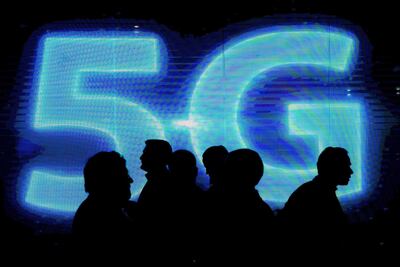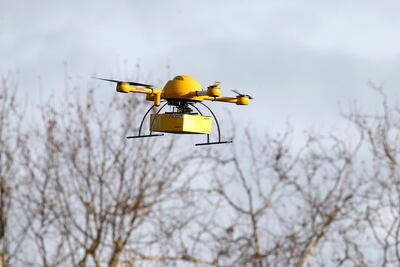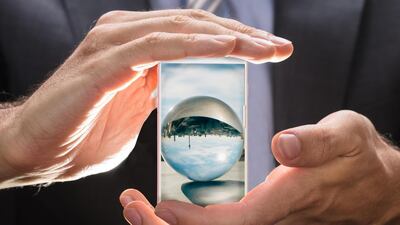The business of making technological predictions for this year has changed a lot over the past decade. Back in 2009, when the first Android phone was just a couple of months old and the App Store not much older, gadgets were keenly awaited and their capabilities feverishly anticipated. Today, that excitement comes with a side order of concern about the way innovations might negatively affect our lives. History, of course, is littered with examples of technophobes sounding alarm bells over everything from lacemaking machines to colour TV, but today's technology is so closely integrated with our lives that new products and services inevitably present us with a series of profound questions, both moral and philosophical.
The rise of AI
This year, cities will become more reliant on artificial intelligence.
This will include networks of sensors detecting everything from traffic congestion to emergency service responses, and managing those situations automatically. China is the world leader in implementing these systems, and the resulting urban environments – all-seeing, all-knowing – have been criticised for being excessively invasive. But all nations will have to deal with the tension between the efficient running of a modern city and the privacy of its citizens.
While cities get ever smarter, "smartness" will come baked into more and more products, from cameras to mattresses, and toothbrushes to golf clubs. The all-pervasiveness of technology in our environment was predicted back in the late 1980s, when American scientist Mark Weiser envisioned "calm technologies", which receded into the background of our lives "until they become indistinguishable from it". Our health will certainly end up depending on it; AI is set to be more widely used in fields such as radiology, with machine-learning improving the accuracy of medical imaging. Innovations are also anticipated in wearable devices that will allow blood pressure to be tracked, potentially improving the lives of millions.

Enter, 5G
One of the technologies that will eventually facilitate all this connectivity is the much-hyped 5G. The first 5G network launched in the UAE in May last year, and hundreds of 5G base stations will be dotted across the country by the end of this year. It's unlikely to become a mainstream consumer technology until next year, but 2019 will see the launch of the very first 5G phones, with Samsung due to unveil a model in the next six months. Faster than any domestic fiber-optic internet connection and up to 250 times faster than existing cellular networks, 5G will reduce the time it takes to send or receive information to less than one millisecond – in other words, almost in real time. With this speed boost, the idea of "remote control" goes global. Doctors will, one day, be able to operate on patients from the other side of the world. Online gaming will take a quantum leap, and the still-unproven technology of self-driving cars will finally gain our trust. Cars' reaction times will become faster than that of humans, fewer accidents will occur and traffic will move more easily.
Driverless cars
This, in turn, will herald the arrival of computerised cars as chauffeurs, and in particular their use by private hire companies such as Uber and Lyft, both of which are due to launch on the stock market this year. Even if you prefer to drive yourself, it'll be difficult to escape the technological onslaught; Korean car manufacturer Kia is about to launch an AI-powered feature to detect the emotions and mood of the driver, altering lighting, temperature and other systems to make the ride more comfortable.

Drones fly in
In other transport news, this year will see a trial in Finland of a drone delivery service by Wing, a sister company of Google, with packages of food, medicine and other goods weighing up to 1.5kg delivered by air. It's by no means the first example of drone delivery – Costa Coffee tested a service in Dubai more than a year ago, and Wing trialled its service in Australia last year – but it marks another step towards automated delivery and the decline of traditional shopping. Google and its parent company, Alphabet, will continue to extend their tentacles. Two new mid-priced Pixel phones look set to surface early this year in response to the success of the iPhone XR, Apple's bestselling phone to date. Google Assistant, the AI featured in Google's range of smart speakers, is rumoured to be built into new Samsung television sets this year, bolstering the firm's presence in the living room.
The big tech companies
Apple's plans for the year are, as ever, shrouded in mystery, but eagle-eyed observers have noted its recent purchase of an augmented reality headset maker, and its recent hires from the car industry indicate that Titan, Apple's automotive project, is ongoing. Microsoft, meanwhile, will soon be launching a new 4K webcam for Windows 10 PCs, which represents another step towards passwords being replaced by facial recognition systems.
Facebook moves into 2019 with a degree of nervousness. The data privacy scandals of 2018 have left the company scarred, and it will spend this year trying to win back user trust. Google is shutting down its own failed social network, Google+, in April, but it's also developing a social gaming platform called Arcade which may encroach on Facebook's territory. Every social media platform will have to contend with public disquiet over the collection and monetisation of personal data, as governments across the world consider legislation to hold these platforms to account. Some of them may even end up blocking access as part of a complex information war.
_________________
Read more:
Is the world ready for the era of 'visual search'?
AI-created photos: a threat or opportunity?
How WhatsApp has given rise to a new era of fake news
_________________
As the battle to inform and misinform gets more intense, it will become harder to discern truth from fiction. Data scientist Katja Bego has warned that faked audio-visual material may provoke a serious global incident this year, assisted by a poisonous geopolitical climate. And as technology confounds us, it will also come to our rescue, with augmented and virtual-reality devices to soothe and distract us: bread and circuses for the 21st century.
It all makes for a grimly fascinating landscape. The big question for this year is not what technology can do for us, but what technology will do to us.


